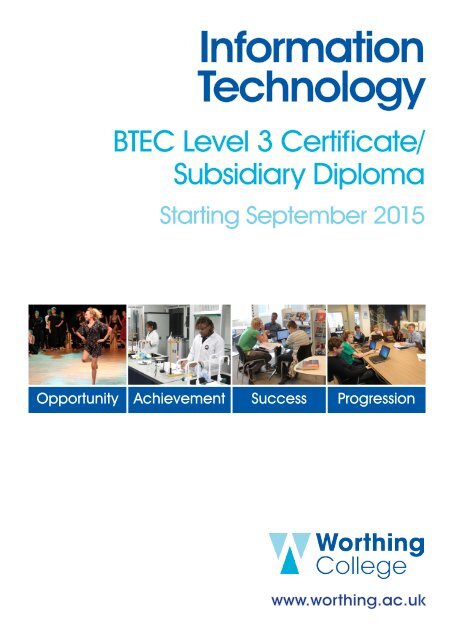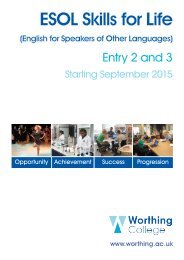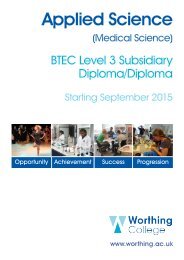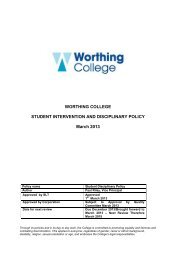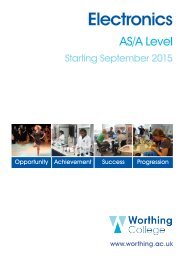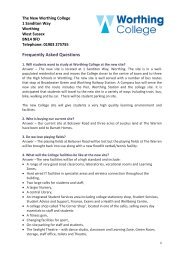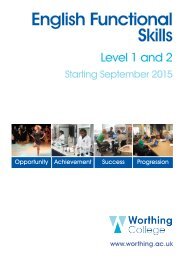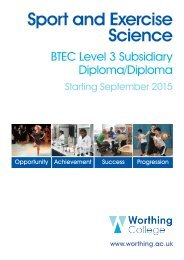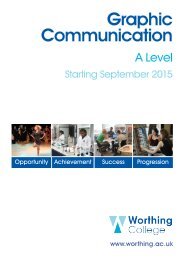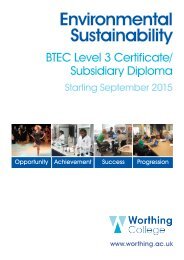Information Technology Level 3 BTEC Certificate ... - Worthing College
Information Technology Level 3 BTEC Certificate ... - Worthing College
Information Technology Level 3 BTEC Certificate ... - Worthing College
You also want an ePaper? Increase the reach of your titles
YUMPU automatically turns print PDFs into web optimized ePapers that Google loves.
<strong>Information</strong><br />
<strong>Technology</strong><br />
<strong>BTEC</strong> <strong>Level</strong> 3 <strong>Certificate</strong>/<br />
Subsidiary Diploma<br />
Starting September 2015<br />
Opportunity Achievement Success Progression<br />
www.worthing.ac.uk
When do I start studying for<br />
this qualification?<br />
September 2015.<br />
For how long will I study?<br />
For two years.<br />
One year to complete the <strong>Certificate</strong><br />
(equivalent to one AS <strong>Level</strong>). Two years<br />
to complete the Subsidiary Diploma<br />
(equivalent to one A <strong>Level</strong>).<br />
What is this course about?<br />
This is a work-related qualification<br />
which provides preparation for<br />
employment in a variety of IT-based<br />
occupations or progression onto further<br />
study. The topics covered include:<br />
• Practical experience in a variety of<br />
software packages including webpage<br />
design<br />
• Investigation into how IT is used in<br />
the world of business.<br />
What topics will I study?<br />
Year 1<br />
Communication and Employability<br />
Skills for IT:<br />
Non-technical skills and attitudes,<br />
known as soft skills, are key to<br />
employability as well as the technical<br />
skills and knowledge required for<br />
specific jobs in IT. Soft skills are those<br />
skills relating to an individual’s ability to<br />
communicate and work effectively with<br />
others, to use appropriate language,<br />
be dependable and conscientious, and<br />
to generally behave in an acceptable<br />
manner in the workplace. Soft skills<br />
complement hard skills, which are<br />
the knowledge, understanding and<br />
technical skills required to do a job.<br />
In this unit you will come to appreciate<br />
the soft skills you need to develop to<br />
become an effective employee. You<br />
will identify and consider your own soft<br />
skills and, through practice, improve<br />
these skills.<br />
Computer Systems:<br />
At some stage most IT professionals<br />
will have to set up and customise<br />
a computer system or systems. To<br />
do so effectively they will need to<br />
understand the components that make<br />
up computer systems. The operating<br />
system interacts with the hardware and<br />
software components in order to make<br />
a functioning machine.<br />
In this unit you will consider a range of<br />
hardware and come to understand the<br />
technical specifications of components.<br />
Website Production:<br />
Designers of websites must use<br />
increasingly sophisticated techniques<br />
to capture interest, as well as ensuring<br />
that an appropriate company image<br />
is presented. Usability issues, such<br />
as navigation methods, must be<br />
considered carefully.<br />
This unit starts by exploring web<br />
architecture and the factors that<br />
influence website performance. You<br />
will investigate the web development<br />
process from identification of need,<br />
design, build, and test through to<br />
review.<br />
Year 2<br />
A further 3 units will be studied in the<br />
second year.<br />
Digital Graphics:<br />
Many documents incorporate an<br />
element of graphics or graphic design.<br />
From the layout of the text, to the<br />
image used to promote a product, it is<br />
expected that there will be some form<br />
of graphic representation.<br />
<strong>Technology</strong> enables the production and<br />
reproduction of images to all scales,<br />
sizes and colours. High-capacity<br />
storage devices, digital cameras,<br />
specialist software and printers mean<br />
that high quality and appropriate<br />
images can be designed and produced<br />
more easily than before. There is now
little excuse for not creating documents<br />
that use graphic images effectively.<br />
Computer Animation:<br />
Computer animation is the art of<br />
creating moving images through the<br />
use of computers. It brings together<br />
computer graphics and animation<br />
techniques. Animation does not require<br />
computers, however the increasing<br />
ability of computers to create and<br />
manipulate sets of images has allowed<br />
basic animation to reach new levels of<br />
sophistication and realism.<br />
To create the illusion of movement, a<br />
sequence of images is displayed over<br />
time and the human eye perceives<br />
this sequence as continual movement.<br />
This technique is at the heart of all<br />
existing technologies such as television<br />
and motion pictures. It is increasingly<br />
created by means of 3D computer<br />
graphics, although 2D computer<br />
graphics are still widely used for low<br />
bandwidth and faster real-time needs.<br />
Only 2D graphics are required in this<br />
unit.<br />
Computer Game Production:<br />
Learn how to produce 2-D computer<br />
games. This unit includes an<br />
introduction to computer programming.<br />
You will also look at the affect of<br />
computer games on individuals and<br />
society.<br />
What skills and interests do<br />
I need beforehand to be a<br />
successful applicant for this<br />
course?<br />
• A passionate interest in computers<br />
and technology<br />
• Sound numeracy and<br />
communication skills<br />
What skills will I need to<br />
develop during the course to<br />
succeed?<br />
• Time management<br />
• Independent research<br />
• Teamwork<br />
• ICT<br />
Are there any specific entry<br />
requirements?<br />
You will need a minimum of four<br />
GCSEs at A*- C grade.<br />
What have I got to do in order<br />
to do well?<br />
• Manage time efficiently to complete<br />
all planning, practical and research<br />
tasks<br />
• Communicate effectively both in<br />
writing and verbally<br />
• Be prepared and equipped for all<br />
lessons<br />
• Have tenacity to solve problems<br />
independently.<br />
How will my work be<br />
assessed?<br />
All units are assignment based,<br />
allowing you to build up a portfolio of<br />
your work. There are no exams.<br />
(continued overleaf)
What do students say about<br />
this course?<br />
“Although it can be very demanding,<br />
this course is definitely enjoyable. The<br />
website creation part of Unit 28 has<br />
been my favourite aspect of the course<br />
so far, as I have always been interested<br />
in the design and coding side of IT.”<br />
“Great course! Lots of practical<br />
applications.”<br />
“ I love <strong>BTEC</strong> ICT and I’m really<br />
enjoying it, especially the web design.<br />
You get support if you need it. I really<br />
recommend it.”<br />
Is there a similar qualification<br />
to this one? If so how do I<br />
choose between them?<br />
Our AS/A <strong>Level</strong> ICT is similar, but<br />
is assessed through exams and<br />
coursework (100% exam in Year 1,<br />
60% exam in Year 2).<br />
Are there any other<br />
qualifications which combine<br />
particularly well with this one?<br />
This course combines well with a<br />
very wide range of subjects including<br />
business and finance, the sciences and<br />
maths, humanities, arts, languages and<br />
sport.<br />
What do people do with the<br />
<strong>Information</strong> <strong>Technology</strong> <strong>BTEC</strong><br />
<strong>Level</strong> 3 Subsidiary Diploma?<br />
The <strong>BTEC</strong> <strong>Level</strong> 3 Subsidiary Diploma<br />
in IT is valued by employers and can<br />
lead to career opportunities in Business<br />
Systems Management, E-Commerce,<br />
Management <strong>Information</strong> Systems or<br />
Database Management. Alternatively,<br />
you may wish to progress to higher or<br />
further education or an apprenticeship.<br />
Correct at issue date. Please see www.worthing.ac.uk for updates.<br />
Apply now on-line at www.worthing.ac.uk<br />
T: 01903 275755<br />
E: info@worthing.ac.uk<br />
Issue 09.2014


